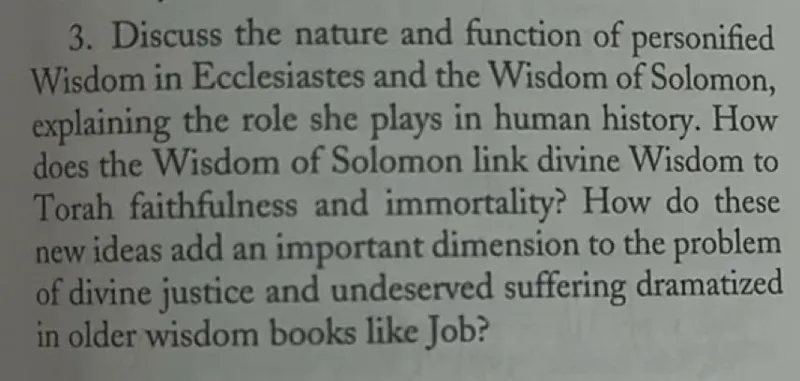To address the nature and function of personified Wisdom in Ecclesiastes and the Wisdom of Solomon, we must first understand the context and themes of these texts within the broader wisdom literature of the Bible.
In Ecclesiastes, Wisdom is portrayed as a valuable but ultimately limited tool for understanding life's complexities. The book, traditionally attributed to King Solomon, reflects on the meaning of life and the human condition. Wisdom in Ecclesiastes is personified as a guide that helps individuals navigate life's uncertainties, but it is not depicted as having divine attributes or ultimate answers. The author, often referred to as "the Teacher" or "Qoheleth," emphasizes the limitations of human wisdom, acknowledging that it cannot fully comprehend God's plans or the mysteries of life. This perspective is encapsulated in the recurring theme of "vanity" or "meaninglessness," suggesting that human efforts, including the pursuit of wisdom, are ultimately transient.
In contrast, the Wisdom of Solomon, a deuterocanonical book, presents Wisdom as a divine attribute closely associated with God. Here, Wisdom is personified as a female figure who is both a companion to God and an active participant in creation. She is depicted as a source of guidance, protection, and moral insight, leading the righteous towards a life of virtue and ultimately, immortality. The text links divine Wisdom to Torah faithfulness by emphasizing that adherence to God's laws is a manifestation of true wisdom. This connection suggests that living in accordance with divine Wisdom leads to a deeper understanding of God's will and the promise of eternal life.
Personified Wisdom in these texts plays a crucial role in human history by offering a framework for understanding the relationship between God and humanity. In Ecclesiastes, Wisdom provides a means to cope with life's uncertainties, while in the Wisdom of Solomon, she is a divine guide leading the faithful towards righteousness and eternal life. This dual role highlights the evolving nature of wisdom literature, reflecting different theological perspectives on the human experience.
The Wisdom of Solomon adds an important dimension to the problem of divine justice and undeserved suffering, as dramatized in older wisdom books like Job. In Job, the central question revolves around why the righteous suffer and how divine justice operates in a world where suffering seems arbitrary. The Wisdom of Solomon addresses this issue by suggesting that divine Wisdom offers a path to understanding and overcoming suffering through faithfulness to God's laws. It posits that true wisdom leads to moral integrity and ultimately, immortality, providing a hopeful resolution to the problem of suffering.
In summary, personified Wisdom in Ecclesiastes and the Wisdom of Solomon serves different functions, reflecting the diverse theological perspectives within biblical wisdom literature. While Ecclesiastes emphasizes the limitations of human wisdom, the Wisdom of Solomon presents divine Wisdom as a guiding force towards righteousness and eternal life. This evolution in the portrayal of Wisdom offers a nuanced understanding of divine justice and the human experience, addressing the age-old question of why the righteous suffer and how they can find meaning and hope in the face of adversity.






